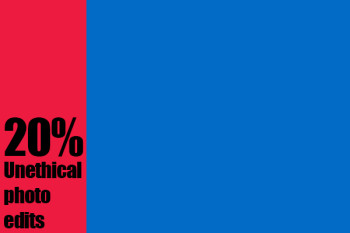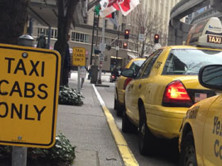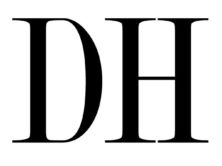
(Credit: London Shearer Allen)
Twenty percent of the penultimate entries to this year’s World Press Photo contest were disqualified because of unethical photo edits, the U.S. National Press Photographers Association’s ethics committee reported.
That’s more than double than last year, when only eight percent of entries were knocked out.
Nearly 98,000 images were entered in the contest, the World Press Photo said on its website.
Photographers had to give “files as recorded by the camera” to the contest to compare with the submitted photo, the World Press Photo said on its website.
“Our independent experts found anomalies in a large number of files and presented their findings to the jury. According to the contest rules, only retouching of files that conforms to currently accepted standards in the industry is allowed, and the jury is the ultimate arbiter of these standards,” the World Press Photo said.
Its managing director, Lars Boering, said on the World Press Photo website that “the content of the image should not be altered,” but photograpgers were “careless” in their “post-processing.”
“When this meant a material addition or subtraction in the content of the image, it lead to the images being rejected from the contest,” he explained, adding:
“It seems some photographers can’t resist the temptation to aesthetically enhance their images during post-processing either by removing small details to ‘clean up’ an image, or sometimes by excessive toning that constitutes a material change to the image. Both types of retouching clearly compromise the integrity of the image.”
The NYTimes reported that Agence France Presse’ Patrick Baz, one of those on the awards committee, told the Times that the Photoshoppers weren’t novices. “Some of the biggest names in photography did this — people who are in the pantheon,” he said.
The NPPA listed numerous questions about the significant percentage of altered photos and praised the World Press Photo organization for maintaining high ethical standards:
“The questions raised by those statistics are numerous. What do we read from the fact that the percentage rose? Are more photojournalists seeing a justification for altering their work? Are they doing it daily, or just for the competitions? What sort of manipulation is taking place?”
The NPPA called for the disqualified photographers to transparently tell the public what changes they made to get disqualified. “Either stand by their work or admit their transgression, and offer explanation and engage in the dialog about what the standards are and/or should be,” the committee wrote, adding thatb y doing so, it would educate and help photojournalism ethics.
iMediaEthics has written to the World Press Photo for comment.
UPDATE: 2/25/2015 5:42 PM EST World Press Photo media coordinator Barbara Bufkens told iMediaEthics by e-mail:
“This year, for 92 stories and singles the unprocessed files were requested for analysis during the penultimate round. All but 2 photographers submitted their unprocessed files upon request; those 2 entries did not proceed to the final round.
After reviewing the expert’s report and debating the issues, the jury decided that 20 entries were not eligible for the finals. That is 22% from the entries at that stage still in competition. Almost all categories were affected, however the Sports category was hit most. As a result, only two awards were given from the remaining entries.’
She added that “Last year, after reviewing the expert’s report and debating the issues, the jury decided that 8% from the entries at that stage still in competition were not eligible for the finals. These were stories and singles ruled to be ineligible, entered in the Nature, Sports, People, Spot News and Contemporary Issues categories.”
CORRECTION - February 25, 2015 10:15 AM
Twenty percent of the penultimate round entries were rejected, not twenty percent of all entries as originally stated. We regret the error.







Comments Terms and Conditions